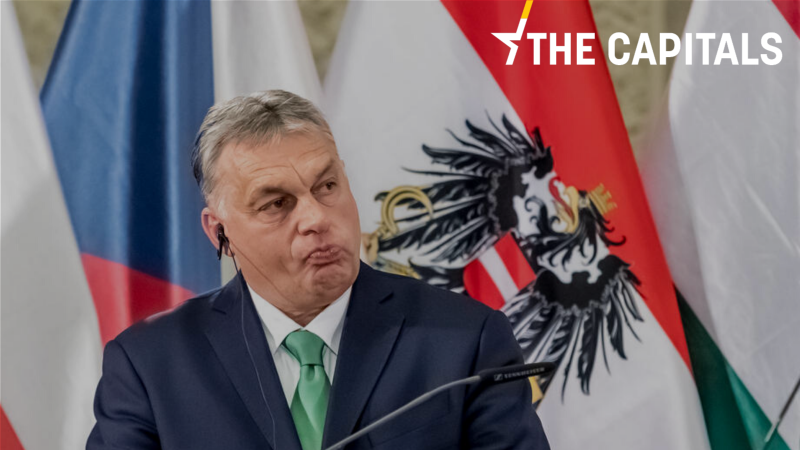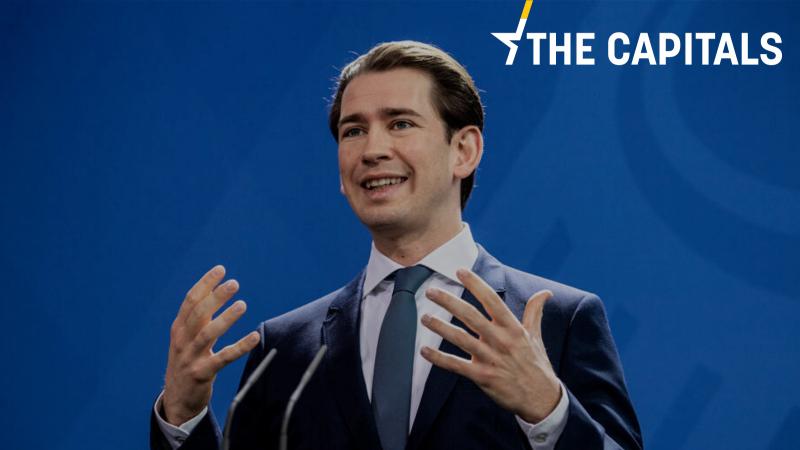
Before you start reading today’s edition of the Capitals, we invite you to read Dave Keating’s “MEPs push for raw materials focus in EU’s new industrial strategy“, as part of our Special Report on “Raw materials in the EU economy“.
Also, feel free to take a look at Alexandra Brzozowski’s story “In State of the Union, Trump hails ‘American comeback’ amid domestic storm“.
///
VIENNA. After Chancellor Sebastian Kurz rejected EU High Representative Josep Borrell’s idea of reviving Operation Sophia for monitoring the arms embargo against Libya on grounds that having EU-boats rescuing shipwrecked migrants could be interpreted as “a ticket to Europe”, Social Affairs Minister Rudolf Anschober of the Greens openly disagreed with Kurz’s stance on Monday (3 February), saying he would welcome EU-boats rescuing migrants. EURACTIV Germany’s Philipp Grüll reports.
BERLIN
German states weigh banning the niqab in schools. A Monday (3 February) ruling by a Higher Administrative Court in Hamburg has sparked calls for states across Germany to change school laws to ban the wearing of veils that fully cover the face. EURACTIV Germany’s Sarah Lawton has more.
///
PARIS
French fishermen to be back in Guernsey. French fishermen should be able to return to Guernsey waters by the end of the week after they had been deprived access since Brexit came into force, French Secretary of State for European Affairs Amélie de Montchalin said. “I think that by the end of the week if we work as we said we would, things will return to normal,” the secretary of state said during a visit in Caen. (EURACTIV.FR)
Also read: Paris aims to become Europe’s top financial hub in post-Brexit world
///
BRUSSELS
Tobacco advertising. From January 2021, all forms of tobacco advertising will be banned in Belgium, the Belgian parliament’s Health Committee agreed unanimously, removing the few exceptions that existed under the parliament’s 1999 ban. EURACTIV’s Alexandra Brzozowski digs deeper.
///
HELSINKI
Tax cuts and a fund to fight climate change. The Finnish five-party government, criticised for not doing enough to combat climate change, has published a “roadmap” to become the world’s first carbon-neutral welfare society by 2035, saying it would “specify the timetable and objectives for the preparation of climate measures”. EURACTIV’s Pekka Vänttinen takes a closer look.
UK AND IRELAND
LONDON
National parliaments not needed for post-Brexit ratification. The chair of the European Parliament’s trade committee voiced hope on Tuesday (4 February) that an agreement with the UK could be achieved by November and said national parliaments would not be needed to ratify the deal as it would be an EU-only association agreement. Jorge Valero has the story.
///
DUBLIN
Google investigation. The Irish Data Protection Commission has announced that they are to embark on a formal investigation of Google, due to concerns over the way the company processes user location data. The investigation has been actioned after Ireland’s data protection watchdog received a series of complaints from consumer organisations related to the legality of Google’s processing of location data and the transparency of such processing. Samuel Stolton has more.
EUROPE’S SOUTH
MADRID
The government will ‘listen’ to farmer demands. Spain’s Agricultural Minister, Luis Planas, announced on Tuesday (4 February), that the left-wing coalition government (socialists of PSOE and far-left Unidas Podemos) plans to reform the current food chain legislation and is open to discuss the practice of selling below production costs, EURACTIV’s partner EFE AGRO reported. The announcement comes after farmers took to the streets because of the very low prices of their produce (they say some products have similar prices to 20 years ago). EURACTIV’s partner EFE has more.
///
LISBON
Companies and organisations sign plastics agreement. About 50 companies and other organisations committed on Tuesday (4 February) to reach by 2025 the goals of having only recyclable plastics in the packaging sector and ensuring all newly manufactured plastic is made of 30% recycled and 70% used packaging from recycled plastic. In 2018, Portugal only recycled 12% of the plastic from urban waste, meaning only 72,000 tons of a total of 600,000 had been recycled. Read the full story by Lusa.pt’s António Pereira Neves here.
In other news, Portugal’s waste imports have more than quadrupled in the last three years from 60,000 tons in 2017 to 250,000 tons in 2019. Portugal’s Environment Minister João Pedro Matos Fernando assured on Monday (3 February) that requests from other countries for the disposal of waste in Portuguese landfills are being considered with “much more stringency”, due to the increase. Marta Duarte, from Lusa.pt, has more. (António Pereira Neves and Marta Duarte, Lusa.pt)
///
ROME
Inverting EU “poles”. In a meeting with Commission President Ursula von der Leyen, Italy’s PM Giuseppe Conte has called for the Stability and Growth Pact to be reviewed by switching its “poles” to give priority to boosting growth instead of stability aspects. He also said that EU competition rules were outdated and applying them faithfully would prove detrimental to establishing industrial champions. (Gerardo Fortuna | EURACTIV.com)
///
ATHENS
New law to control migration-related NGOs. A new law that provides a special registry for all non-governmental organisations (NGOs), their employees and partners, was voted on Tuesday (4 February). EURACTIV Greece’s Theodore Karaoulanis has more.
VISEGRAD
Macron in Poland – day 2. French President Emmanuel Macron travelled from Warsaw to Krakow on the second day of his visit to Poland to give a lecture at the Jagiellonian University in Kraków, where he covered multiple topics, from common European history and identity to climate change. EURACTIV Poland’s Łukasz Gadzała examines Macron’s speech and analyses the importance of his trip for French-Polish relations.
///
BRATISLAVA
EU´s budget vs TV appearance. Slovak PM Peter Pellegrini (Smer-SD) will miss the first part of the extraordinary European Council on the EU’s long-term budget due to take place on 20 February. Pellegrini apologised to European Council President Charles Michel, explaining he needs to attend one of the major TV election debates. Pellegrini will most likely ask Czech PM Andrej Babiš to fill in for him. (Zuzana Gabrižová | EURACTIV.sk)
PRAGUE
No more flights to China. Although no Czech citizen has yet been infected by the coronavirus, the Czech government decided to stop all direct flights from and to China starting from 9 February till further notice. The Czech government also said that it will provide China with healthcare products worth €200.000. (Aneta Zachová | EURACTIV.cz)
///
BUDAPEST
Viktor Orbán at the conservative conference in Rome. After meeting European Council President Charles Michel on Monday (3 February), the Hungarian PM travelled to Rome to participate in a conference of European conservatives entitled “God, Honor, Country: President Ronald Reagan, Pope John Paul II, and the Freedom of Nations— A National Conservatism Conference.” What did Orban say at the conference?
///
In other news, the country’s security cabinet has adopted a new security strategy, while the country’s military strategy is being drafted, Defence Minister Tibor Benkő told a meeting on Tuesday (4 February), following the evaluation of last year and looking ahead to plans for this year. The proposed strategy focuses on Europe’s defence capabilities and the strengthening of relations with the UK and France, Benkő said in front of senior military officials. EURACTIV’s Željko Trkanjec looks into Hungary’s defence strategy.
///
‘More Patriotic’ national curriculum accepted. The new amendment to Hungary’s national curriculum has finally been accepted. While the government is positive that the changes will grant “Hungarian youth to rise among the world’s best by 2030″, critics contend that parts of the curriculum are now too “ideologically driven”. EURACTIV Croatia’s Željko Trkanjec looks into why.
NEWS FROM THE BALKANS
SOFIA
No US visa for corrupt Bulgarian. US Ambassador to Bulgaria, Herro Mustafa, said on Tuesday (4 February) that in a few days US Secretary of State, Mike Pompeo, will announce the first Bulgarian citizen to be banned from travelling to the US for reasons linked to corruption. “The United States intends to take tougher measures in the fight against corruption”, the ambassador said in an interview for Nova TV. “It will only be the first (announced) name, but there will be others afterwards. To name a person, we must have evidence. This first case is very clear, so we decided to act quickly”, the ambassador said. (Krassen Nikolov | EURACTIV.bg)
In other news, President Rumen Radev announced that he was officially withdrawing his confidence in the government, which according to him is not acting in the interests of Bulgarian citizens. “The lack of will to reform and fight against corruption, the methodical violation of law and morality, led to the paralysis of entire public systems and institutions with no analogue in the history of the Bulgarian transition”, Radev said. “This government and administration are leading to the collapse of the state and depriving us of our future as a nation,” the president added. (dnevnik.bg)
///
LJUBLJANA
Consultation with the president on a future government. President Borut Pahor opened formal consultations with parliamentary parties following the resignation of PM Marijan Šarec. The options are to form a new coalition in the current parliament or hold snap elections. While the Pensioners Party (DeSUS) favours a coalition and the Liberal SAB would like to be part of a government both are ready for elections. Kingmaker is Janez Janša, leader of conservative, nationalist SDS (EPP), who can either form a new coalition or go to the polls. His decision will be known on Friday. (Željko Trkanjec | EURACTIV.hr)
///
ZAGREB
New abortion bill? Parliament will debate on Wednesday the new Social Democratic party (SDP) abortion bill that will make abortion free, accessible and legal. EURACTIV Croatia’s Karla Junicic has more
///
In other news, PM Andrej Plenković confirmed Croatia’s stance regarding the new Multiannual Financial Framework (MFF). After the Friends of Cohesion meeting, which took place in Portugal on Saturday, the PM said at Tuesday’s conference on ”The challenges of adopting the new MFF 2021-2027 and the position of cohesion policy in the new budget ” that the next decade is crucial for Croatian membership in the European Union. EURACTIV Croatia’s Karla Junicic has more on this story.
///
SARAJEVO
Religious leaders hold a common prayer for war victims and peace. Leaders and representatives of the four largest religious communities in BiH participated on Tuesday (4 February) in a common prayer dedicated to all the victims of the country’s 1992-1995 war, expressing a desire for lasting peace. EURACTIV Croatia’s Željko Trkanjec has more.
///
PODGORICA
Should Đukanović go to Sarajevo? By voting against the invitation to Montenegrin President Milo Đukanovic, Bosnian Serb presidency member Milorad Dodik showed that he is not a serious politician, Croat presidency member Željko Komšić said, adding that at the beginning of its mandate, Bosnia’s tripartite Presidency sent invitations to all the presidents from the region – including Đukanović, to pay a visit to Bosnia.
Milorad Dodik said that he did not agree with the invitation to Montenegrin President to visit BiH “given the current situation in Montenegro” (situation regarding the Law on Religious Freedom). (Željko Trkanjec | EURACTIV.hr)
***
[Edited by Sarantis Michalopoulos, Daniel Eck, Benjamin Fox]
EURACTIV's editorial content is independent from the views of our sponsors.





Za sudjelovanje u komentarima je potrebna prijava, odnosno registracija ako još nemaš korisnički profil....